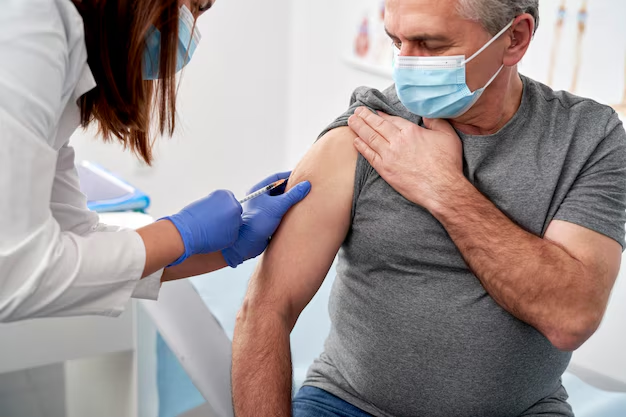Your Guide to Pneumonia Vaccines: When and Why You Should Get Them
Pneumonia is more than just a stubborn cough or a season of discomfort. It’s a serious lung infection that can lead to severe complications if not addressed properly. One way to protect yourself is through vaccination. But how often should you get a pneumonia shot? This article delves into that very question, providing clarity and understanding without you needing to decipher complex medical jargon. Let’s explore the world of pneumonia vaccines, so you can make informed decisions about your health.
Understanding Pneumonia Vaccines
What is Pneumonia?
Before diving into vaccines, it’s essential to clarify what pneumonia is. Pneumonia is an infection that inflames the air sacs in one or both lungs, which may fill with fluid or pus, leading to cough, fever, chills, and difficulty breathing. The infection can be caused by a variety of organisms, including bacteria, viruses, and fungi.
Types of Pneumonia Vaccines
Pneumococcal Conjugate Vaccine (PCV13)
This vaccine protects against 13 types of bacteria that cause serious pneumococcal disease, including bacteremia, meningitis, and pneumonia. Originally recommended for young children, it's also crucial for adults with certain health conditions or those aged 65 and over.
Pneumococcal Polysaccharide Vaccine (PPSV23)
Covering 23 types of pneumococcal bacteria, this vaccine is recommended for all adults who are 65 years or older and for those aged 19 through 64 who have certain risk factors, such as smoking or specific chronic conditions.
How Often Should You Get the Pneumonia Shot?
Recommendations for Children
- Infants and Toddlers: The PCV13 vaccine is typically administered in a series of four doses, given at 2, 4, 6, and 12-15 months of age.
- Children under 5 who missed these vaccines: Catch-up schedules may be recommended.
Recommendations for Adults
- Ages 65 and Older: It's usually advised to get both the PCV13 and PPSV23. The sequence and timing depend on prior vaccinations and health status.
- Adults with Certain Health Conditions: At-risk adults aged 19 or older, who have not previously received the vaccine, may require one or both vaccines.
Special Situations for the Pneumonia Vaccine
People with weakened immune systems might need additional considerations when it comes to pneumonia vaccines. Always consult with your healthcare provider for personal recommendations.
Why Get Vaccinated Against Pneumonia?
Protecting Vulnerable Populations
Pneumonia can be particularly severe in certain populations, including young children, adults over 65, and individuals with chronic illnesses or weakened immune systems. Vaccination helps protect these vulnerable groups from severe outcomes.
Decreasing Disease Transmission
Vaccines not only protect individuals but also help reduce the spread of pneumonia-causing bacteria within the community. The more people vaccinated, the fewer opportunities for the disease to spread.
Cost-Effective Health Management
Avoiding hospitalization or treatment for severe pneumonia through vaccination is not just medically beneficial but also cost-effective. Prevention often leads to fewer treatment costs.
Common Concerns and Misconceptions
Can I Get Pneumonia from the Vaccine?
A common misconception is that vaccines can cause the illness they are meant to prevent. Rest assured, the pneumonia vaccine cannot give you pneumonia, as it does not contain live bacteria.
Side Effects: What to Expect
- Common Side Effects: Usually mild, including redness at the injection site, mild fever, or muscle aches. These side effects typically resolve within a few days.
- Rare Reactions: Severe reactions are very uncommon. Always inform your healthcare provider of any allergies or reactions to previous vaccines.
How the Pneumonia Vaccine Fits into Your Overall Health
Integration with Other Vaccines
Pneumonia vaccines can often be administered alongside other vaccines, such as the annual flu shot. Your healthcare provider can advise on the best schedule that suits your specific health needs.
Lifestyle and Preventive Health
Getting vaccinated is just one aspect of maintaining your health. Adopting a healthy lifestyle, such as eating a balanced diet, exercising regularly, and avoiding smoking, can enhance your immunity and overall well-being.
Discussing Vaccination with Your Healthcare Provider
When meeting with your healthcare provider, it’s helpful to discuss:
- Your medical history
- Any medications you currently take
- Previous vaccinations you’ve received
- Special health considerations, such as chronic conditions or planned surgeries
This dialogue ensures your vaccination schedule is tailored specifically to your needs.
Empowering Yourself with Information
The decision to get vaccinated is a personal one and should be made with understanding and confidence. Reliable information is key, so make sure to seek trustworthy sources and consult with medical professionals. Vaccines are a powerful tool in protecting both individual and public health.
Pneumonia Vaccine Quick Guide
- 👶 Children (0-5): Series of PCV13 at 2, 4, 6, 12-15 months.
- 🧑 Adults (19-64) with Risks: Consult on PCV13 and PPSV23 needs.
- 👵 65+ Adults: Usually receive both PCV13 and PPSV23.
- 💬 Discuss with Your Doctor: Any specific health concerns.
- 🛡️ Protects Against: Severe illness, reduces transmission.
- 🤝 Community Health: Vaccination benefits everyone.
- 📅 Stay Informed: Regularly review your vaccination status.
Taking these steps not only protects you but also contributes to broader public health efforts. Embrace this opportunity to stay informed and ready against pneumonia.

Related Articles
- a Typical Pneumonia
- Can a Cold Turn Into Pneumonia
- Can a Sinus Infection Turn Into Pneumonia
- Can Amoxicillin Cure Pneumonia
- Can Amoxicillin Treat Pneumonia
- Can Baby Oil Cause Pneumonia
- Can Bronchitis Turn Into Pneumonia
- Can Covid Turn Into Pneumonia
- Can Doxycycline Treat Pneumonia
- Can Flu Turn Into Pneumonia
